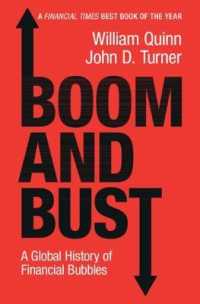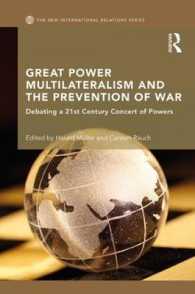- ホーム
- > 洋書
- > 英文書
- > Nature / Ecology
Full Description
The menace of a post-truth era challenges conventional policy-making and science. Instead of fighting an uphill battle against populist solutions, those involved in both policy-making and science have to find innovative ways to collaborate, and make use of the vast amounts of knowledge that are already available. Knowledge brokerage, in this context, is more than a simple question-and-answer game: it is a process of co-creating and re-framing knowledge. In addition, Knowledge brokerage has to deal with trade-offs and ambiguities, as well as world-views, cultures and the preferences of stakeholder groups.
This book is the first in-depth exploration of how knowledge brokerage has the potential to help manage the challenges of sustainable development across political and scientific systems. It presents a selection of innovative and practical tools to enhance the connectivity of research and policy-making on sustainable development issues. In doing so, this book will be an essential publication in research and policy-making. It supports networking among the developers and users of knowledge brokerage systems and will make their experience better known to the different communities involved.
The book presents interviews with leading policymakers and researchers such as former EU Commissioner Franz Fischler, Robert-Jan Smits (Director-General of Research and Innovation at the EC), Uwe Schneidewind (President of the Wuppertal Institute), and Leida Rijnhout (European Environmental Bureau). It also provides insights into eleven EU funded projects dealing with different approaches of Knowledge Brokerage for Sustainable Development.
Contents
Foreword
Carlos Moedas, Commissioner for Research, Science and Innovation, European Commission
Preface
Edeltraud Hanappi-Egger, Rector of Vienna University of Economics and Business
Introduction
Part A: Challenges and worldviews
1. A new narrative for Europe
Franz Fischler
2. Communicating limits to growth
Jørgen Randers
3. Agenda setting in European policy
Robert-Jan Smits
4. Policy learning in EU Member States
Elisabeth Freytag and Wolfram Tertschnig
5. The need for more transdisciplinary research
Uwe Schneidewind
6. Providing scientific advice in critical situations
Lucia Reisch
7. Why evidence is often not enough to influence policy
Hadelin de Beer de Laer
8. Understanding the context of policy making
Klaus Jacob
9. The role(s) of NGOs in linking science and policy making
Leida Rijnhout
10. The relationship between science and policy in the United States
Maurie Cohen
11. The role(s) of professional facilitators
Peter Woodward
Part B: Projects and experiences
1. SPIRAL: Improving science-policy interfaces for biodiversity
2. PRIMUS: Bridging the gap between research and policy-making on local sustainability
3. BESSE: Knowledge brokerage and innovation for a sustainable sanitation
4. PACHELBEL/STAVE: Shining a light on citizens' everyday environment-related behaviours
5. AWARE: Bridging the knowledge of citizens, scientists and policy-makers for sustainable water ecosystems management
6. WATERDISS: Analysis and uptake of water research results
7. BRAINPOOL: Knowledge brokerage for bringing alternative indicators into policy
8. RESPONDER: Linking sustainable consumption and growth debates following a systems thinking approach
9. CORPUS: Linking research and policy for evidence-based policy-making on sustainable consumption
10. PSI-CONNECT: Knowledge exchange in river basin management
11. FOODLINKS: Building communities of practice for learning on sustainable food consumption and production
Knowledge brokerage for sustainable development: Experiences, recommendations and research outlook
André Martinuzzi








